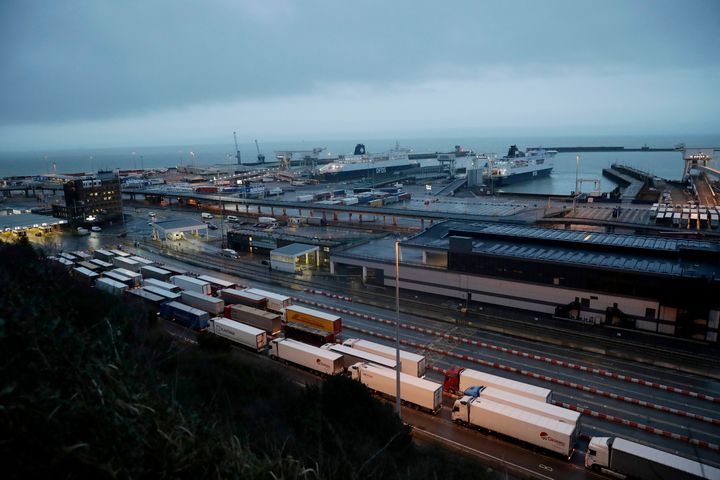
Negotiations between the U.K. and European Union over a post-Brexit trade deal remain on a knife edge Monday, in what is likely to be one of the most intense days of talks since they began months ago.
British Prime Minister Boris Johnson and Ursula von der Leyen, the European Commission president, agreed both sides would reopen the troubled negotiations on Sunday, after they were “paused” on Friday.
Failure to strike a deal covering annual trade worth nearly $1 trillion could cost hundreds of thousands of jobs on both sides, and disrupt cross-Channel trade for years to come.
But following a late night and intense discussions over the remaining differences – fishing quotas, fair competition rules and how to resolve disputes – there is still deadlock, with France threatening to veto a deal.
“EU-U.K. negotiations have entered the endgame, time is running out quickly,” an EU diplomat said. “It is for the U.K. to chose between… a positive outcome or a no-deal outcome.”
What happens now?
Legally, the transition period, during which the U.K. effectively remains part of the EU trading zone, ends Dec. 31 and Johnson has ruled out seeking any extension.
It then logically follows that, if no last-minute deal is struck in the coming hours, Britain will leave the EU without any future relationship in place and will fall onto default World Trade Organization rules.
What does that mean for the British economy?
A no-deal outcome means from Jan. 1 there will be significant tariffs in place on car and agriculture exports, which could in turn jeopardize jobs and industry.
Britain’s Office for Budget Responsibility (OBR) warned earlier this month that no-deal would leave the U.K. worse by 1.75% in terms of GDP next year and unemployment could reach 8%.
To put it in context, Bank of England Governor Andrew Bailey has said that no-deal would be a greater long-term hit to the economy than the COVID-19 pandemic.
In the days before Dec. 31, the U.K. government is expected to do all it can to prepare businesses, however the head of Britain’s National Farmers Union, Minette Batters, warned a no-deal would be “catastrophic” for agriculture.
What about the borders and importing goods?
The U.K. would have a hard border with the EU, where before there was free flow of goods, services and people.
A leaked document prepared for the British government, known as the Yellowhammer report, predicted a three-month “meltdown” as rules and regulations governing imports, exports and customs would effectively be ripped up overnight under no-deal.
Officials forecast lines of 7,000 trucks at the cross-channel port city of Dover, and two-day waits to get into France.

This could also mean delays to food supplies, goods and potentially medicine.
A report on Sunday suggested supplies of the COVID-19 vaccine would be flown into the U.K. by military aircraft.
And environment secretary George Eustice admitted at the weekend that there could be “some impact” to food prices to consumers.
What about Northern Ireland?
The Brexit withdrawal agreement negotiated by Johnson protected Northern Ireland’s soft border with the EU, with the region expected to continue to follow some of the bloc’s rules.
But the British government’s controversial Internal Markets Bill and the Finance Bill both override that deal by tying the region to the rest of the U.K.’s rules.
The EU has said the legislation breaches international law and has begun legal proceedings. Eustice confirmed Sunday the government intends to press ahead if no deal is struck.
President-elect Joe Biden has stressed the importance of keeping the Irish border open following Brexit.
“The idea of having a border north and south once again being closed is just not right, we’ve just got to keep the border open,” Biden told reporters in November.
Biden discussed Brexit with Johnson earlier in November during one of his first phone calls to other world leaders as president-elect, warning him Brexit must not jeopardize the Northern Ireland peace process.
Will this be how it is forever?
Both sides agree that a trade deal is preferable to no deal.
It is highly unlikely that, even if Britain crashes out of the bloc later this month, talks for a future agreement would not reopen in the future, given the two markets’ close proximity and shared interests.
How much damage is caused to international relations and both the U.K. and EU economies in the meantime remains to be seen.
How much time is left for a deal?
Alexandre Holroyd, a French parliamentarian and ally of President Emmanuel Macron, told the BBC Sunday evening: “I think there is one deadline which is set in absolute stone which is Dec. 31 and that is the absolute deadline.”
But any agreement has to be ratified by both the U.K. parliament and the European parliament as well as signed off by the EU leaders. Time is running out.
There had been hopes that could happen at a two-day summit in Brussels starting on Thursday — the final scheduled gathering of the year.
With reporting from The Associated Press.
Calling all HuffPost superfans!
Sign up for membership to become a founding member and help shape HuffPost’s next chapter
Related posts:
Views: 0
 RSS Feed
RSS Feed

















 December 7th, 2020
December 7th, 2020  Awake Goy
Awake Goy  Posted in
Posted in  Tags:
Tags: 
















